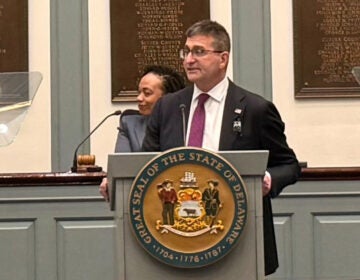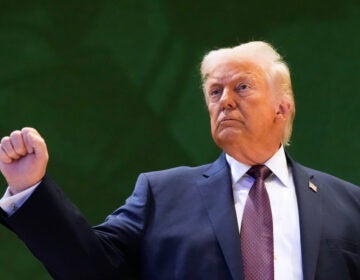Where do Dem candidates for Pa. governor stand on crime, prisons, and marijuana?
ListenCriminal justice isn’t one of the top issues for Democrats running in this years gubernatorial primary in Pennsylvania, but that’s not to say the four candidates are avoiding the subject altogether. And given that there are tens of thousands of people in the state’s prison system, small policy differences can have a large impact on people’s lives.
Pennsylvania’s gubernatorial primary is just a few weeks away. With four Democrats left in the race, we’re taking a look at what sets each of them apart from one another.
Once a week until the primary, WHYY’s Morning Edition host Jennifer Lynn will interview our beat reporters about where the candidates stand on some of the issues we cover. This week it’s crime and prisons with WHYY’s Holly Otterbein.
—
Criminal justice isn’t one of the top issues for Democrats running in this years gubernatorial primary in Pennsylvania. None of them is mentioning it in their TV ads, and only state Treasurer Rob McCord and former DEP Secretary Katie McGinty detail their views about criminal justice on their websites.
But that’s not to say the four candidates are avoiding the subject altogether. And given that there are tens of thousands of people in the state’s prison system, small policy differences can have a large impact on people’s lives.
“They all do have plans to reduce crime,” said WHYY reporter Holly Otterbein. “Education and job creation are the most popular answers for doing that.”
Candidates also have more specific proposals for making Pennsylvania safer. McGinty has suggested cutting down on prescription drug abuse and providing better care for the mentally ill. York businessman Tom Wolf wants to do away with mandatory minimum sentences, while the other three candidates including Rep. Allyson Schwartz support some kind of sentencing reform.
And all four are warm to the idea of loosening the state’s marijuana laws. For Schwartz, decriminalizing small amounts of the drug could free up prison cells. “We are seeing incarceration from simple possession of marijuana,” said Schwartz. “That is unnecessary, it clogs our criminal justice system, and we should end that.”
For McCord, who says he wants to study full legalization, it’s about using profits as a source of public money. “If we’re going to go there, we need to examine the evidence. And I think you would want to, if you go there, legalize it so you can both regulate and tax it to create good jobs and revenues to invest in the things the public needs.”
McGinty and Wolf both support medical marijuana and decriminalizing small amounts.
So will the candidate who becomes the Democratic nominee for governor have to flesh out their positions on criminal justice or marijuana law in any greater detail? Probably not, says Otterbein.
“I think that criminal justice issues are similar to poverty issues in that we don’t see a lot of candidates talking about them in major campaigns. It’s just not a popular thing to talk about.”
WHYY is your source for fact-based, in-depth journalism and information. As a nonprofit organization, we rely on financial support from readers like you. Please give today.





